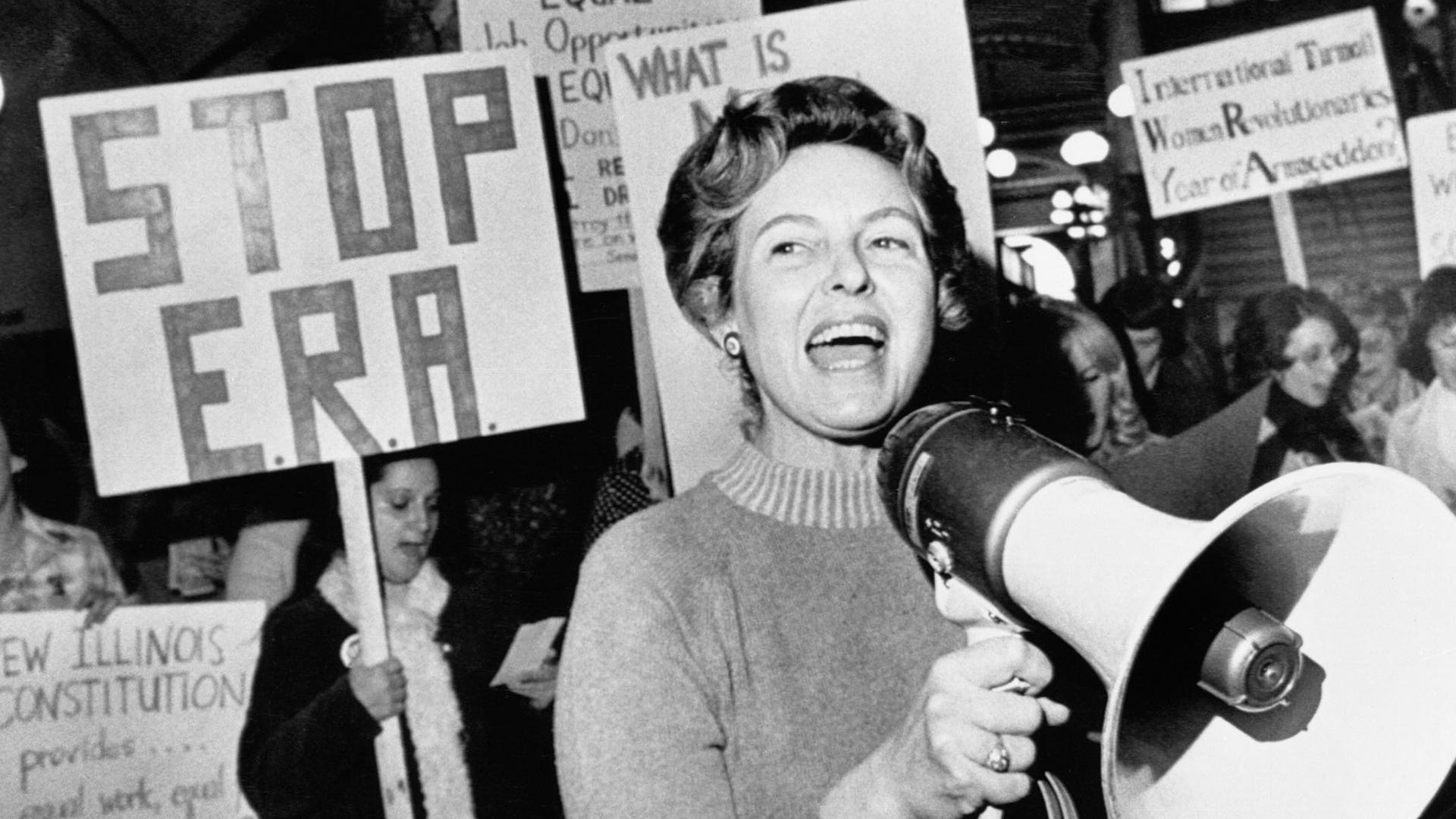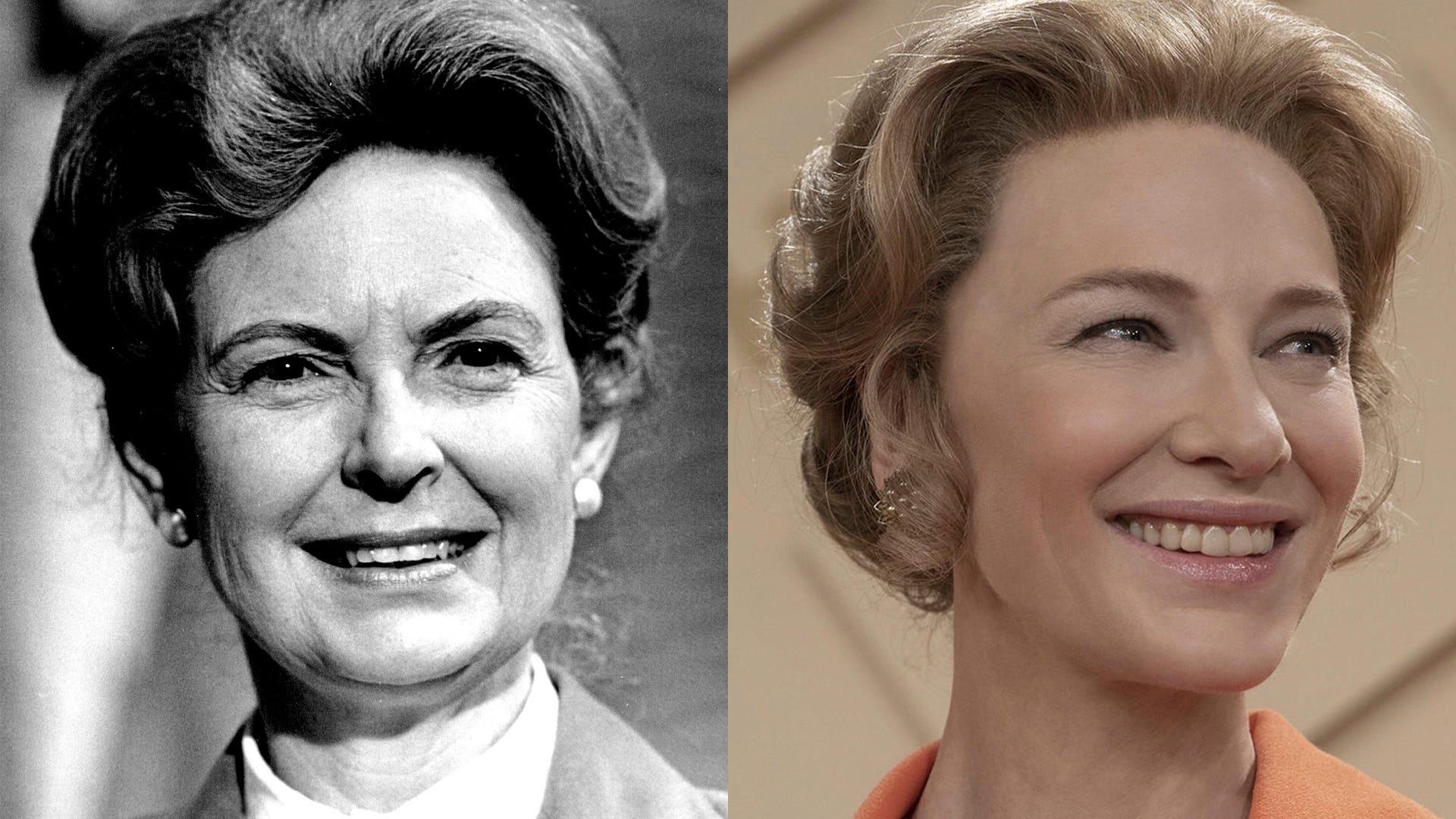Join or Sign In
Sign in to customize your TV listings
By joining TV Guide, you agree to our Terms of Use and acknowledge the data practices in our Privacy Policy.
What You Need to Know About Mrs. America's Phyllis Schlafly, the Inspiration for Cate Blanchett's Role
All about the real-life conservative icon depicted in the FX series
Mrs. America, which debuted this week via FX on Hulu, is one of the most anticipated series of 2020. With a knockout performance from two-time Oscar and three-time Golden Globe winner Cate Blanchett, Mrs. America provides a sweeping view of the modern feminist movement, as it traces the story of the push to ratify the Equal Rights Amendment in the early 1970s. Reviews are good, and for good reason: Mrs. America not only makes history come alive, but makes it entertaining, poignant and relevant to today too.
In the series, Blanchett portrays Phyllis Schlafly, a woman who became highly influential to conservatives and a worthy study for those who follow women's history. Schlafly has been dubbed the "First lady of the conservative movement," whose efforts helped to defeat the ERA. To people who believe women should take on "traditional" roles (i.e. prioritizing marriage, domestic duties and child-rearing) Schlafly was a champion, but for the more liberal-minded who value gender equality, equal pay and abortion rights, Schlafly was viewed as dangerous.
Through her grassroots campaigning, Schlafly rallied people around anti-feminist causes; she once said, for example, "Sexual harassment on the job is not a problem for virtuous women." Due in large part to her influence, the ERA -- which would have guaranteed equal legal rights for all American citizens regardless of sex and ended legal distinctions between men and women in terms of divorce, property, employment, and other matters -- failed to become federal law.
In FX's series, viewers will get to see how Schlafly crafted her narrative and mobilized people around it, but they'll also see how other feminist leaders of the day, including Shirley Chisholm (Uzo Aduba), Gloria Steinem (Rose Byrne), and author Betty Friedan (Tracey Ullman) came to see her as a menace. Who was Phyllis Schlafly, and how'd she rise to power? Here's what you should know about her before watching Mrs. America.
Discover Your New Favorite Show: Watch This Now!

Phyllis Schlafly
GettyHer background
Schlafly, who died in 2016 at age 92, grew up in a staunchly Republican household in St. Louis, and after leaving Washington University to get a master's degree in political science at Radcliffe, she hoped to work for the government in D.C. When that didn't work out, she returned home at age 24 and married John Schlafly -- a lawyer and fellow conservative from a banking family. Republicans wanted her husband to run for Congress and he turned them down; she volunteered to do it instead, winning a Republican primary but losing the general election. By the late 1950s, she'd become a leader, speaking out against Communism and by the 60s, writing about national defense issues. She'd been conservative all her life, basically, but it was in 1971, when a friend asked her to debate a feminist about the ERA, that she studied up on the amendment and decided it was dangerous.
Why was she against the ERA?
Good question. As Blanchett put it at the Television Critics Association winter press tour in January,
"What was so terrifying about the notion of equality?" In short, Schlafly believed the ERA would jeopardize laws guaranteeing alimony and exempting women from combat, for starters. But by the time the ERA had come to her attention, she'd had a world view long shaped by conservative ideology. Some quotes that help illuminate her thinking: On the pay gap she said, "One reason a woman gets married is to be supported while caring for her children at home. So long as her husband earns a good income, she doesn't care about the pay gap between them." And of same-sex marriage, she had this to say in 2010: "Nobody's stopping them (LGBTQ people) from shacking up. The problem is they are trying to make us respect them, and that's an interference with what we believe."

What she accomplished
She wrote or edited more than 20 books, including A Choice Not an Echo, which aimed to expose the influence that "kingmakers" had on the Republican primary nomination. Released in 1964, it sold some three million copies. She was, at one point an officer, of the Daughters of the American Revolution, and president of the Illinois Federation of Republican Women from 1956 to 1964. By the 1970s, she'd become a media savant, like the Alex Jones or Rush Limbaugh of her time, blending half-truths, conspiracy theories and political rhetoric through media appearances and a mailed newsletter that was almost like the Twitter of the time.
She founded The Eagle Forum in 1975, a pro-family, anti-feminist group that's still going and promotes the idea that a family should only consist of a father, mother and children, supports English-only education in schools, and opposes same sex-marriage. Historical scholars say her ideas and influence helped Ronald Reagan rise to prominence, and she supported Donald Trump in his 2016 campaign. He attended her funeral.
Mrs. America debuts with three episodes on Wednesday, April 15 on FX on Hulu. New episodes will air each subsequent week.
